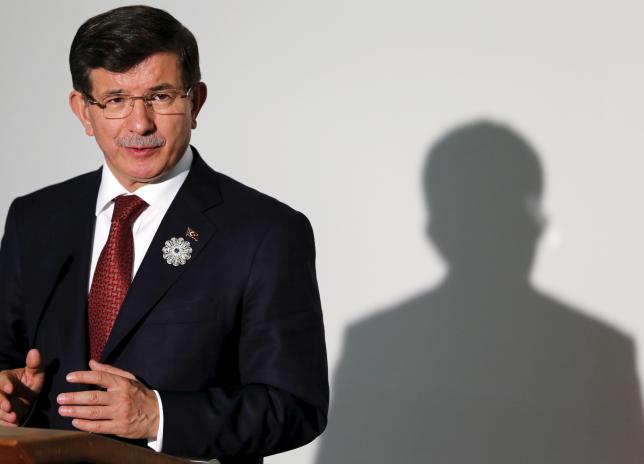Turkey PM Davutoglu starts coalition talks, defends Erdogan
ANKARA: Turkish Prime Minister Ahmet Davutoglu kicked off long-delayed talks on forming a coalition government on Monday after firing a warning to opposition parties not to question the role of President Tayyip Erdogan in the political process.
Opposition parties have signalled they want Erdogan to keep out of daily politics if they join any coalition government - a direct challenge to the president, who wants to turn his largely ceremonial role into a powerful executive post.
The Islamist-rooted AK Party, which Erdogan founded, lost its parliamentary majority in a June 7 election for the first time since it came to power in 2002, forcing it to seek a junior coalition partner or face the prospect of a fresh election.
Despite Erdogan's repeated calls for a new government to be formed quickly, some senior officials have suggested the best interests of both Erdogan and the AK Party could be in the failure of coalition talks and a new election.
Davutoglu, an AKP veteran, held a first round of coalition consultations on Monday with Kemal Kilicdaroglu, leader of the main opposition party, the staunchly secularist CHP.
The premier described the talks as "sincere" and "friendly", adding that both he and Kilicdaroglu had stressed the need to form a strong coalition government quickly. But he also said the discussions did not amount to formal coalition negotiations.
Davutoglu earlier told opposition parties, who want Erdogan to stop chairing cabinet meetings, that rejecting the president's active role would doom the coalition talks.
"Opening to question the legitimacy of our president or the respectability of his office would lead to the sabotage of the coalition talks from the start," Milliyet newspaper quoted Davutoglu as saying.
Despite a constitutional ban on the head of state engaging in party politics, Erdogan turned last month's parliamentary election into a referendum on his own ambitions of forging an executive presidency.
The outcome frustrated those ambitions - at least for now - and plunged Turkey into political uncertainty not seen since the unstable coalition governments of the 1990s.
EARLY ELECTION POSSIBLE
Erdogan on Monday again urged parties to form a coalition government quickly, warning regional threats made further delays untenable and reiterating that if they are unable to, a snap election would become necessary.
"It is time to leave behind the prelude and enter the phase of service. If politicians can’t solve their issues, then the people are the ones to solve this matter," Erdogan said in a speech to a business group in comments that were broadcast live.
The Hurriyet daily reported Davutoglu as saying that if the coalition talks proved unsuccessful there would be a snap election, from which the AKP would benefit the most.
A poll commissioned by the AKP has shown that 5 percent of voters would not back opposition parties again if there were an early election, according to a report by the pro-government Yeni Safak newspaper over the weekend, suggesting the AKP could then win enough seats to form a single-party government.
The poll found the AKP would most likely take enough votes back from the CHP and the rightist Nationalist Movement Party (MHP) to give it 280 seats, up from 258 now, the newspaper said.
In a separate development that was seen as a setback to Erdogan's perceived ambitions to consolidate power, the Constitutional Court late on Monday struck down legislation he ushered through as prime minister in 2014 that was due to go into effect in September and ban university-preparatory centres.
The changes were as widely seen as a blow to the Hizmet (Service) movement, led by U.S.-based Islamic cleric Fethullah Gulen, Erdogan's ally-turned-foe.
Hizmet runs many of the schools, which provide the network with both revenue and new recruits, but has faced the president's ire, including dozens of arrests, over its alleged role in exposing a corruption scandal in 2013 that tarnished Erdogan's inner circle.






